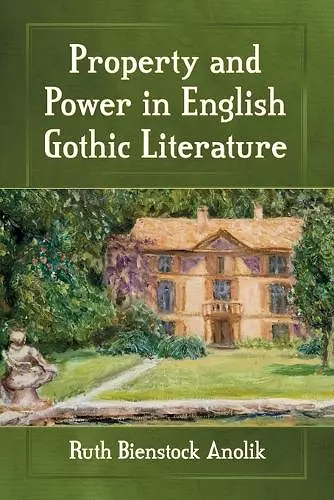Property and Power in English Gothic Literature
Format:Paperback
Publisher:McFarland & Co Inc
Published:12th Jan '16
Currently unavailable, and unfortunately no date known when it will be back

Eighteenth-century England witnessed major social and economic changes, including the commodification of property, person and text through legal containments--enclosure, coverture, primogeniture, copyright. English Gothic authors responded with tropes that worked to dispel the assurances of possession--the contested castle, the beleaguered yet enduring woman, the haunting ghost, the disjointed narrative--warning that seemingly mundane codes of ownership have menacing implications, such as the civil death of women through marriage. This book explores the masterplot of the English Gothic text as a response to the Enlightenment's rational certainty regarding possession of self, property and narrative.
“A detailed discussion of property, ownership, and power in English Gothic literature”—SFRevu; “From detailed discussions of Maturin’s Melmoth the Wanderer to Sarah Water’s Affinity, Anolik tackles the question of why possession always fails in the British gothic literary tradition. Clearly written and theoretically informed, this book is a valuable introduction to the burgeoning field of gothic studies.”—Diane Long Hoeveler, author of The Gothic Ideology; “Beginning with the origins of the Gothic, moving to a rich comparison of numerous nineteenth-century texts, and concluding with a compelling reading of the neo–Victorian contemporary novel, Property and Power in English Gothic Literature traces the Gothic novel’s resistance to containment and order as it persistently fragments and decenters. Anolik makes a significant contribution to Gothic studies in her reading of the novel as a transgressive genre that subverts categorization and inherently resists various forms of critical and readerly ownership and possession.”—Jolene Zigarovich, Sex and Death in Eighteenth-Century Literature; “Teasing out multiple meanings of possession...ownership of property, body, gendered identity, and inner self...Ruth Anolik’s study illuminates a variety of Gothic texts, including major eighteenth- and nineteenth-century examples of the genre as well as a neo-Victorian revision. Lucidly written, deftly argued, and usefully situated in relevant political and social contexts, this book makes a welcome contribution to Gothic studies.”—Tamar Heller, author of Dead Secrets: Wilkie Collins and the Female Gothic.
ISBN: 9780786498505
Dimensions: 229mm x 152mm x 12mm
Weight: 345g
244 pages